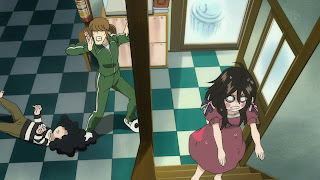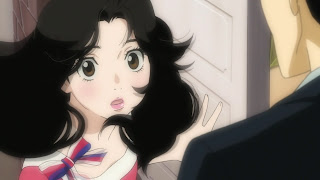Three episodes in and we still really haven’t had a misstep here. Not everything has been comfortable to watch, but I think that’s intentional – in a way this show is like spying on the characters private lives. And what you see and hear isn’t always pretty.
This was definitely a Kuranosuke-centric episode, and there was an awful lot of exposition to it. He’s quite unlike any other character in the show. Despite being a cross-dresser, he’s totally comfortable in his own skin. He has no filter whatsoever, saying whatever crosses his mind without a thought to the repercussions. And because he’s lived a sheltered life, he appears to have no idea what the social ramifications of his words might be.
We learned an awful lot about him this week. As hinted at, his uncle is the Prime Minister. But quite surprisingly something of an oddball, full of lame jokes and seemingly unperturbed by Kuranosuke’s cross-dressing. We also learn that the Sisterhood’s building is slated for demolition as part of the local “improvement” project, sure to be a source of much drama later. Most interestingly Kura appears not to be of the same mother as his older brother Shu – probably a mistress’ child. He doesn’t know where his mother is – most likely her relationship to his father is a well-guarded secret – but he clearly took much of what he is from her. He cross-dresses to escape the fate of being a politician, which he feels is worse than death – content to leave that to Shu.
 It was interesting to see the inevitable makeover sequence for Tsukimi, who looked rather good afterwards. Of course, she can’t go home looking like that, which leads to a harrowing and hilarious sequence of events that leaves her looking like either a ghoul or a “Chinese hopping vampire”, but not before Shu gets a glimpse of her and is promptly smitten. This prompts Kuranosuke to play matchmaker – is he not interested in girls, or just Tsukimi, or simply shy?
It was interesting to see the inevitable makeover sequence for Tsukimi, who looked rather good afterwards. Of course, she can’t go home looking like that, which leads to a harrowing and hilarious sequence of events that leaves her looking like either a ghoul or a “Chinese hopping vampire”, but not before Shu gets a glimpse of her and is promptly smitten. This prompts Kuranosuke to play matchmaker – is he not interested in girls, or just Tsukimi, or simply shy?
What strikes me about this show right now is the unflinching way the characters are portrayed. There’s no effort made to romanticize anything here – especially the Sisterhood. Though perhaps Kura’s judgment of them as NEETs is a bit harsh, there’s no question that they live in a fantasy world – an extended childhood dependent on support from their parents. These are women in their thirties, all of whom avoid social contact, harshly judge those who don’t and spend their time pursuing their personal obsessions. There’s a charming innocence to it, but for me it’s more sad than anything. On the other hand, they do live with a measure of freedom most folks in industrialized nations don’t – certainly Kura’s family included. Yet the price is isolation in a prison of their own choosing. Rather than conform they choose voluntary imprisonment, and Kuranosuke chooses cross-dressing. Is there a comment here on the steep price Japanese society demands for individualism?





